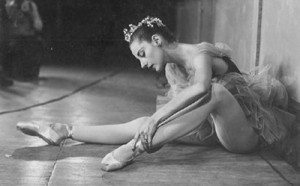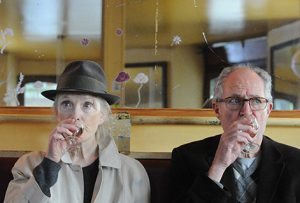
 Walking into the Walter Reade Theater at 9 AM, I was almost certain I wouldn't be on time for the first festival film of the day. Not that I was too shaken up over it, as I hadn't intended to attend that screening anyway. But as luck would have it, I overestimated the amount of time it would take to get there, and I arrived with plenty of time to see "Afternoon Of A Faun: Tanaquil Le Clercq". Knowing absolutely nothing about the movie other than being disinterested in its title, I took my seat and for the first time, participated in the New York Film Festival.
Walking into the Walter Reade Theater at 9 AM, I was almost certain I wouldn't be on time for the first festival film of the day. Not that I was too shaken up over it, as I hadn't intended to attend that screening anyway. But as luck would have it, I overestimated the amount of time it would take to get there, and I arrived with plenty of time to see "Afternoon Of A Faun: Tanaquil Le Clercq". Knowing absolutely nothing about the movie other than being disinterested in its title, I took my seat and for the first time, participated in the New York Film Festival.
"Afternoon Of A Faun" is a documentary about Tanaquil Le Clercq, a world class ballerina that came into prominence in the 1950s. Discovered at age 15 by renowned choreographer George Balanchine, Le Clercq's unique physique made her a revolutionary ballet dancer. For years she toured with Balanchine's company as his muse, while also catching the attention of another choreographer, Jerome Robbins. Balanchine and Robbins both loved Le Clercq, but Balanchine was the one she married. But there's no real focus on romantic rivalries in "Afternoon Of A Faun", because that's not the point. What we pay most attention to is the tragedy that befell Le Clercq. In 1956, while in Copenhagen on a European tour, Le Clercq was stricken with polio. The world's greatest dancer would never walk again.
Filmmaker Nancy Buirski does her best to make "Afternoon Of A Faun" appeal to a broader audience outside of dance enthusiasts. As someone who knows little and cares even less about dancing, I found myself able to remain interested because of the naturally tragic story of Le Clercq's life. Buirski's primary narrative device is the real letters written by Le Clercq and her acquaintances throughout her life. These words taken from the pens of the actual parties can be quite moving and give us more of a concrete notion about Le Clercq rather than just listening to people talk about her. Overall, "Afternoon Of A Faun" is a decent documentary, but really doesn't elevate itself above "made-for-TV special" status.
 The second film of the day was "Le Week-End", which I believe is French for "The Week-End". Despite the "Le" in its name, "Le Week-End" is not a French film, but rather a film that takes place in France. Nick and Meg Burrows (Jim Broadbent and Lindsay Duncan) have been married for a while. A long while. For their 30th anniversary, the perpetually combative couple attempt to relive their honeymoon by taking a trip to Paris. The trip doesn't start great, with Meg refusing to stay in the boring, beige hotel room Nick booked. She guilts him into laying down his credit card for a massive suite in an upscale hotel that they have no way of affording. Still, Nick goes along with it, obviously hoping to make his frequently icy wife happy.
The second film of the day was "Le Week-End", which I believe is French for "The Week-End". Despite the "Le" in its name, "Le Week-End" is not a French film, but rather a film that takes place in France. Nick and Meg Burrows (Jim Broadbent and Lindsay Duncan) have been married for a while. A long while. For their 30th anniversary, the perpetually combative couple attempt to relive their honeymoon by taking a trip to Paris. The trip doesn't start great, with Meg refusing to stay in the boring, beige hotel room Nick booked. She guilts him into laying down his credit card for a massive suite in an upscale hotel that they have no way of affording. Still, Nick goes along with it, obviously hoping to make his frequently icy wife happy.
As they roam around Paris, the aging couple fluctuate between good-humored warmth and soul-cutting coldness. Their tumultuous relationship becomes even more rocky when Nick bumps into an old friend from his days at Cambridge, Morgan (Jeff Goldblum). A year younger than Nick, Morgan stuck by his side throughout college and used Nick's philosophies to shape his own life. While it led to great monetary success for Morgan, Nick was less fortunate. When Morgan invites the couple to a dinner party, tensions come to a head and their relationship might not survive the night.
"Le Week-End" suffers from its thematic similarities to Richard Linklater's "Before Midnight", which came out earlier this year. In case you missed it, "Before Midnight" was an absolute masterpiece. It examined the shifting nature of love through new generations, while focusing on the realistic problems faced by an established couple. "Le Week-End" basically only dealt with the latter, and didn't do so as effectively. That's not to put it down too much, as "Before Midnight" is a hard benchmark to reach. Completely separating it from Linklater's movie, "Le Week-End" is a well-crafted, cute movie.
It's not going to strike up any epiphanies in the audience, but "Le Week-End" will do enough to make you care for as long as you're watching it. Broadbent, Duncan, and Goldblum are all terrific, with Goldblum standing out as the face-palmingly conceited Morgan. Much of the comedy is chuckle worthy at best, and the weighty emotional moments don't come across as powerful as they should. Still, it's fair enough for a 93-minute movie.